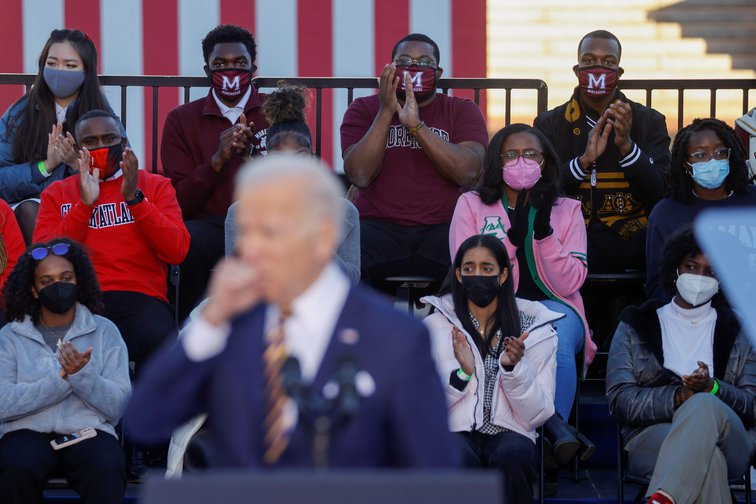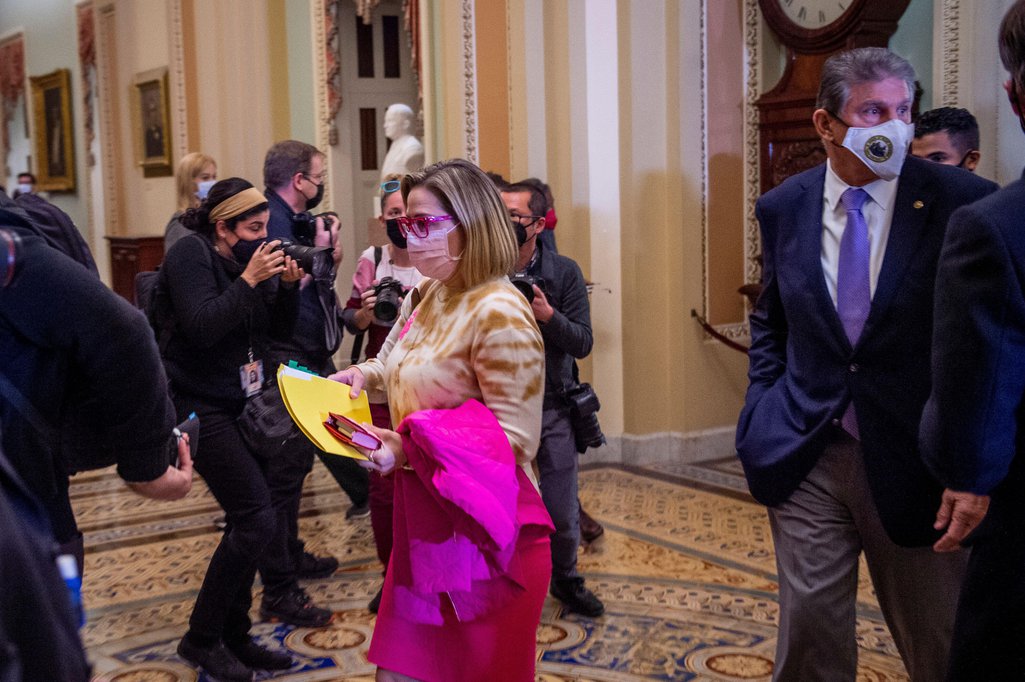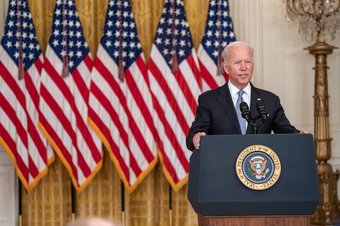
‘Joe Biden owes us’: How a struggling administration can win back voters
Biden is rapidly losing support amongst core constituencies. But he can turn the tide by canceling student debt


“Why does Biden talk about Trump?” Sayed, a Lyft driver, asked me last week in Boston. “Why doesn't he talk about what is going on today? That people can't feed their families. That my children aren't learning anything in school because they have so many teachers out sick right now.”
On the first anniversary of Joe Biden’s entering office, there is an eerie feeling of political paralysis. As Omicron surges across the US, with nearly a million cases everyday and two thousand daily deaths – the administration is failing to, even rhetorically, connect with the hardships many people are experiencing.
Several weeks ago, for example, Jen Psaki, the White House press secretary, scoffed at the idea that the federal government should deliver at-home tests to people (a position on which the administration has since U-turned); while vice-president Kamala Harris told people to “Google” where to find a test when questioned on the shortages. Biden himself, meanwhile, has barely even been questioned by the press – holding fewer news conferences in his first year than any other president in the past 40 years.
But the problems are far deeper than the Omicron wave or communications mishaps.
Biden ran on a bold agenda, promising to pass significant climate legislation, deliver voting rights, and cancel a chunk of student debt. However, one year in, with the likely failure of the Democrats’ signature infrastructure and voting rights legislation, he has alienated many political allies and core constituencies who mobilized to get him elected.
Bernie Sanders – who had been a vocal ally of the administration last year – is publicly asserting that the party has turned its backs on the working class.
Polling from Gallup indicates that Democrats began 2021 with a nine-point advantage. In the fourth quarter of 2021 this reversed to Republicans holding a five-point advantage.
Polling for younger Americans (aged 18-29) is even more striking. Biden currently has an approval rating of 46%, having dropped 13 points since the beginning of the administration, according to Harvard Kennedy School. Some 52% of young people in the US believe that the country’s democracy is “in trouble” or a “failed democracy”.
This palpable frustration is emanating from many people I’ve spoken with across the country this week.
Last week, following Biden’s trip to Atlanta, I spoke to Stephanie Ali, the policy director for the New Georgia Project Action Fund. “When Biden was running there was a lot of talk about being able to work with us, and being experienced in Senate rules and deal making – and that just hasn’t come through,” she said. The New Georgia Project Action Fund, Black Voters Matter along with several other civil rights groups, boycotted the president’s visit.
“Working-class people, disproportionately Black and brown people, delivered the fucking election to Joe Biden, he actually owes us,” said Astra Taylor, the documentary filmmaker and co-founder of the group the Debt Collective, which advocates for student debt cancellation, when we spoke last week.
Meanwhile, Republicans are efficiently mobilizing and clamping down on voting rights in state legislatures across the country. And Democrats now appear consigned to losing control of Congress in the November midterms this year.
Following a very brief honeymoon period, can the administration turn the tide to prevent these midterm losses, and a Republican victory in 2024? It’s possible, but as I’ve heard, Biden must really start delivering – even without Congress.
Retreading the road to nowhere
Biden promised to deliver trillions to invest in green energy and jobs, raise the minimum wage to $15 an hour, cancel a minimum of $10,000 of student debt, pass voting rights, lower prescription drug prices and more. He was not Bernie Sanders or Elizabeth Warren – but for the former vice-president and centrist senator from Delaware – it was fairly impressive.
In the months after Biden’s election, Democrats swiftly passed the $1.9trn American Rescue Plan, which delivered one-off $1400 checks to most Americans, as well as funding for schools, municipalities and small business loans. The plan also lowered child-poverty rates by nearly 30%, with the child tax credit whereby 36 million households received monthly cash payments (of up to $300 per child under six and $250 for children under 18). However, these programs have now all essentially dried up.
Congress also passed the $550bn bipartisan infrastructure package, which includes funding for roads, bridges and water pipes. (Yet it notably does little to cut fossil fuel production.)
And the administration has made some important strides through the power of the executive branch. Biden withdrew troops from Afghanistan (but is now imposing severe economic sanctions in the country, leading to one of the world’s worst humanitarian crises), significantly limited drone strikes abroad, and appointed Lina Khan as head of the Federal Trade Commission, who is spearheading anti-monopoly actions.
Yet the bulk of Biden’s political capital last year was spent on passing – along the slimmest party lines – the Build Back Better package, which included many progressive policy items such as significant climate investments and incentives, an extension of the child tax credit, prescription drug price reform and paid leave.
Related story
However, after shrinking the package from $3.5trn to $1.8trn – to appease the demands of Democratic West Virginia Senator Joe Manchin – Manchin announced his opposition to the plan in December. Manchin’s main opposition to the bill was reportedly the child tax credit, which he claimed parents wasted on drugs.
For many voting rights activists, this long backroom negotiating over Build Back Better came at the expense of passing reforms to electoral and democratic processes, which are being severely restricted by Republican state legislatures across the country.
Georgia and other Republican states have, over the past year, been stripping voter protections to suppress Democratic turnout. According to the Brennan Center, last year 19 states passed 34 laws restricting access to voting, and more than 440 bills with provisions that restrict voting access were introduced in 49 states.
These provisions include enforcing stricter rules for identification, enabling partisan state officials to interfere in local elections, limiting absentee ballot drop-off locations, shortening the window for requesting an absentee ballot, and criminalizing giving food or drinks to people waiting in line.
“We’re seeing every small and large administrative way possible to make it harder to vote,” explained Ali.
“We’ve been disappointed that he’s almost kept a one-track focus on infrastructure and Build Back Better, when [voting rights] should be first and foremost,” she added. Many voters who turned out in Georgia, Ali emphasized, would have liked to see “stronger action from the beginning to protect voter rights”.
Voting rights, most notably the Freedom to Vote Act, which would set national standards to protect voting, and the John Lewis Voting Rights Act, which would restore voting protections stripped by the Supreme Court, were always going to be difficult to pass in a 50-50 Senate.
Unlike Build Back Better – which was designed to pass via a process called reconciliation, which requires only a simple majority (with vice-president Kamala Harris casting the 51st vote) – passing these two acts would require overturning the filibuster, the 60-vote threshold to advance most legislation in the Senate. Democratic Senators Manchin and Kyrsten Sinema have consistently opposed doing so, claiming it will exacerbate political divisions, and without support from all 50 Senate Democrats, the party cannot pass voting rights legislation.

Senators Manchin and Sinema remain committed to the filibuster
Rod Lamkey / Alamy Stock Photo
But many voting rights activists assert that Biden could have prioritized these pieces of legislation and voiced his opposition to the filibuster early in his presidency, when he had more political capital – especially in the wake of the 6 January Capitol riots.
In July, Biden did make a speech in Philadelphia criticizing Republican voter-suppression legislation as a “21st-century Jim Crow assault”. Yet he still refused to voice his opposition to the filibuster.
This changed last week, when the administration and Democratic congressional leadership prioritized passing both voting rights measures. Biden and Harris flew to Atlanta to finally voice their opposition to the filibuster. However, they were met with disdain by local civil rights groups and leaders. Even Stacey Abrams, the 2022 governor candidate did not attend, claiming that she had a scheduling conflict.
“We’ve been doing this work for decades,” said Ali, as she explained the New Georgia Project Action Fund’s decision to boycott the speech. “We didn’t need performance-art speeches here, if anything take that to West Virginia, take that to Arizona. We need a plan.”
“Why make all those poor people stand out in the cold just to tell us things we already know. We just need you to work.”
Right now, there doesn’t appear to be a plan to pass these measures. Biden’s opposition to the filibuster still has not convinced Senators Manchin or Sinema, who again reiterated their support for the procedure last week.
Big, popular and possible(!)
If Biden can not pass climate or voter rights legislation, one significant, and broadly popular, policy that he can unilaterally deliver on is student debt cancellation.
The US has had a student debt crisis for generations. It is now at epic proportions,with around 46 million Americans currently owing a collective $1.8trn of debt.
“I mean you don’t have to be a math genius to see that something is terribly wrong and unsustainable there,” Astra Taylor told me. Millions of Americans have “toxic debt to income ratios. Which impacts your ability to get credit and housing.”
Student debt doesn’t just affect younger Americans. The fastest growing group of student debtors are older Americans (aged over 60) – with people of color and women disproportionately affected. Student debt also has severe psychological impacts and limits the ability to own a home and raise a family.
Biden actually ran his campaign on student debt cancellation. He promised to cancel $10,000 immediately for every borrower. He also vowed to cancel all federal student debt for people who went to public colleges and historically Black colleges and universities for as long as they are earning less than $125,000 a year.
“Those are two significant promises and he has not met them, even though he could have done it on day one using the legal authority he possesses,” explained Taylor.
So why hasn’t he canceled it yet?
Biden’s opposition to student debt cancellation appears to be ideological. As the senator for Delaware, Biden spent his career representing the financial sector. He was one of the main architects behind the 2005 Bankruptcy Reform Bill, which stripped protections from student borrowers, leaving them with the least protections of all debtors. He is also opposed to cancellation because he thinks it would primarily help the privileged elites.
In fact, cancellation would actually disproportionately benefit the poorest Americans. The Roosevelt Institute estimates that if federal student loans were canceled, nearly 70% of the relief would go to the poorest half of Americans.
Donald Trump first paused student loan payments (and interest) in March 2020, which has subsequently been extended by the Biden administration.
When asked about canceling $50,000 of student debt – a move that has the support of Senate Majority Leader Chuck Schumer and Senator Elizabeth Warren – in a CNN ‘town hall’ question and answer session last year, Biden said that he will “not make this happen”.
The very person that you spent all this effort on is breaking their promises to you
But the pandemic, and Biden’s failure to deliver his legislative priorities, has shifted the political terrain. The Biden administration asserted it would restart student loan repayments on 1 February, to mark a return to normality. However, with pressure mounting – from progressive lawmakers such as Representative Alexandria Ocasio-Cortez, as well as Schumer and a group of moderate Democrats including those in swing districts – the administration extended the payment pause to 1 May, which is just a couple months before the midterms.
Taylor thinks the shifting political conditions and grassroots pressure can push the administration to cancel even more debt than activists initially campaigned on: “We’re not getting those [substantive policy programs]. And so I think if anything it’s more urgent for the administration to go above and beyond their promises especially as we head into the midterms.”
Cancellation is also politically prudent. A poll by racial justice organization Color of Change revealed that 84% of Black voters support student debt cancellation and 40% said they would never “vote for a candidate who opposes student loan debt elimination”.
This was echoed by Ali who told me that student debt cancellation is “huge” for Georgia voters because their debts are so large that it's “almost imaginary at this point”.
Biden’s failure to deliver on his promises – from voting rights to climate and student debt – as Ali explained to me, is making voters increasingly apathetic. “The very person that you spent all this effort on, is breaking their promises to you. Now that is where you start to think: ‘well why should I do this, why do I care?’”
With the legislative failures so close to the midterms, and as Republicans coordinate attacks on democracy and voting rights, broad student debt cancellation might be the best sure bet to reinvigorate a floundering presidency and party. As Taylor put it: “We’re advocating for something that is absolutely a win-win. It’s a win for the people in power and it’s a win for debtors.”
Read more
Get our weekly email





Comments
We encourage anyone to comment, please consult the oD commenting guidelines if you have any questions.